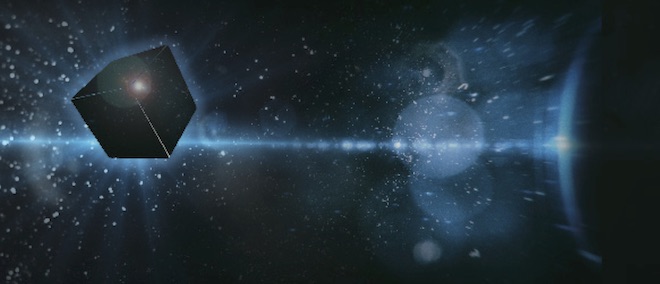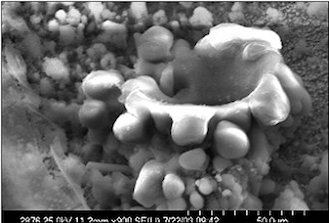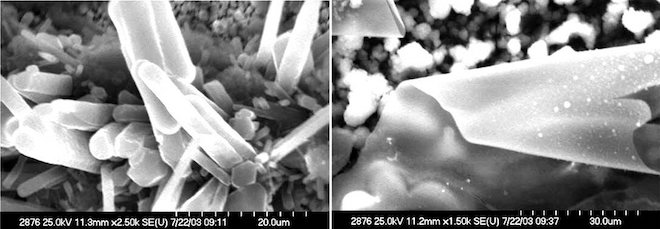Emerging Technology Essay Contest—2nd Place Winner

Low-energy nuclear reactions (LENRs) offer the first opportunity since the advent of fission reactors to change fundamentally the way the Navy powers its ships, systems, and weapons.
Existing energy sources have well-known limitations, particularly at sea. The most advanced batteries cannot sustain long-duration operation, high output, intermittent use, or prolonged storage. Fuel cells face many of the same technical constraints as they did 50 years ago. Diesel and gasoline generators are noisy, polluting, and require both refueling and oxygen supplies. Specialty fuels such as Otto II, used in torpedoes and other special devices, lack sustained energy output.
Turbines are complex and fragile, while radioisotope generators are expensive and rely on hazardous materials. Nuclear (fission) reactors are expensive, heavy, and produce penetrating and harmful nuclear particles. They require heavy and bulky protective shielding, use controlled-distribution nuclear materials, and produce dangerous waste. Nuclear reactors do not readily scale down, although there has been some progress in the development of small modular reactors with less bulk.
LENRs will require substantial development to become practical; but if they fulfill their promise, they will offer a robust energy technology with useful electrical and thermal output and an energy density much higher than fossil fuels.1 (Energy density is used colloquially to mean “specific energy”—the ratio of energy produced to the mass of fuel consumed. It typically is measured in Joules/kilogram.)
Laboratory experiments indicate that, despite the “low-energy” name, this science has the potential to lead to extremely energy-dense, thin, flat devices. In theory, LENRs yields could approach 4 megawatts of thermal power per square meter, ample for almost any purpose. (A well-sited, above average solar panel might produce 0.1 to 0.2 kilowatts per square meter.) LENR systems may have power densities six orders of magnitude (millions of times) greater than chemical-based energy generation or storage systems, and thus could support a variety of military and commercial applications.2
The nuclear reactions in LENRs are distinct from those in fission and fusion and occur in environments at or near room temperature. These neutron-catalyzed reactions are neither exotic nor hypothetical; the physics of LENRs are consistent with the existing Standard Model—that is, they do not conflict with the known laws of physics. LENR processes are based primarily on electroweak interactions rather than the strong-force interactions that drive fission and fusion. And unlike fission reactions, LENRs do not produce any neutron-driven chain reactions.
A Sustained Energy Source
Once the relevant LENR scientific and engineering parameters are more broadly understood and harnessed, LENR energy sources may produce sufficient power to serve as a sort of “nuclear battery” that could power underwater, surface, or airborne vehicles or stationary nodes.
LENR-powered systems could reduce substantially the burdensome logistical and supply chain requirements and vulnerabilities associated with fossil fuels. They would present substantial advantages over fission-based nuclear propulsion. Hazardous radioactive fuel and waste products would be eliminated, and useful energy would be available at many different scales.
Dwell time, hibernation capability, intermittent operation, and autonomous operation all would improve with LENR-based power sources. This would extend dwell time and utility for a whole range of systems—from manned warships to aircraft to small autonomous sensors—across a maritime region. LENRs also could blur the lines between purely aerial, surface, and subsurface vehicles, allowing the possibility of multimodal use.
More Energy Means More Options
Energy-dense power sources could facilitate a wide range of subsurface swarm tactics for offensive, defensive, reconnaissance, decoy, or diversionary purposes. Devices with autonomous power need not necessarily achieve hard kills. Such tools instead could affect ship performance, foul propellers or rudders, defeat sensors, provide surveillance and tracking, or expose portions of the vessel to localized harmful material produced by the device. With so much power, they could loiter indefinitely to monitor and clear minefields or otherwise serve the Navy’s distributed lethality and intelligence, surveillance, and reconnaissance.
Other options abound. LENRs could power and provide operational flexibility for undersea surveillance and could provide increased capability for acoustic tomography. Towed sonar systems could cut their tethers, becoming power-independent of their host ships, able to operate at greater distances to prosecute contacts. Logistics and resupply change dramatically when refueling becomes almost an afterthought.
Autonomous power from LENRs could provide the opportunity to explore intermittent use of active acoustics to supplement passive acoustic sensing. It could power next-generation listening posts for signals intelligence applications or provide a way to create ubiquitous sensor nets to monitor the maritime domain.
In near-Earth orbit, applications could include onboard power, space propulsion, and sustained orbital repositioning capability. Space propulsion thrust requires reaction mass, but a LENR-based system could produce extended thrust at high efficiencies by separating the energy source from the propellant mass.
Although LENRs do not produce nuclear chain reactions, the energy released at local reaction sites can result in temperatures of several thousand degrees. Such heating at least in theory could be initiated at sufficient scale to create rapid and large thermal energy releases. Those could be harnessed to serve as initiators, fuzes, or severable links, or for other special purposes such as a new class of compact ordnance.
A Brief History of LENRs
Surprisingly, LENR experimental phenomena have been observed (though not understood) for more than a century. Since 1912, many examples of these anomalous phenomena have been reported worldwide. Scientific literature in the 1920s and 1930s contains numerous papers on unexplained chemical transmutation and related topics.3
University of Chicago chemists Gerald L. Wendt and Clarence E. Irion synthesized helium using the exploding electrical conductor method in 1922, for instance. Their results were confirmed 80 years later by researchers at the Kurchatov Institute in Russia. Dozens of other such rediscoveries have occurred in the United States, Japan, Russia, and other nations.4
In one case, from 1947 to 1953, Cornell University graduate student Ernest Sternglass documented evidence of what are now understood to be LENR phenomena while investigating secondary electron emissions for the Naval Ordnance Laboratory.5 He knew that nuclear physicist Charles Galton Darwin had predicted in 1920 the possibility of collective many-body excitations of electrons but was unfamiliar with the experiments conducted in the early part of the century.6
Sternglass’s research led him to engage in a series of discussions, both by letter and in person, with Albert Einstein, who encouraged him to proceed with his research. In a prescient, insightful letter dated 26 August 1951, Einstein described a mechanism by which multiple electrons could simultaneously transfer energy to one proton. In doing so, Einstein had intuited a key concept of the many-body collective effects that forms the basis of the theory that has come—55 years later—to explain LENRs.
Setbacks occurred in 1989 when two scientists, Stanley Pons and Martin Fleischmann, incorrectly claimed that the phenomenon was “room temperature fusion.”7 An abundance of experimental evidence was observed and reported around the world early on that conflicted with their fusion hypothesis. Despite this, numerous researchers followed the media excitement and got caught up in the “cold-fusion” frenzy, impeding progress in some cases by insisting on their belief in the fusion idea.8 The view of LENR research as fringe science has damaged objective evaluation of it in the broader scientific community, and thus thwarted access to research funding.
Despite these historical and institutional impediments, academic LENR research has produced a variety of experimentally observed phenomena from low-energy inputs and at moderate system temperatures. These include evidence of isotopic shifts, transmutations from one element to another, thermal effects that are inexplicable and inconsistent with resistance heating, and melted or even vaporized metals.
In the United States, the Navy was a world leader in LENR research and development for some years. The Space and Naval Warfare Systems Command (SPAWAR) Systems Center—Pacific, known as SSC, led the research from 1989 until 2011, when key members of the team retired. SSC staff conducted a series of successful studies, producing approximately 25 papers in peer-reviewed journals, 42 technical presentations, three technical reports, and a patent.9 The Navy experiments produced ample evidence of anomalous thermal events, tritium production, charged particles, transmutation, and low-level neutron emissions.-10 In 2016, the authors published a report summarizing the SPAWAR research.11 Since 2011, however, the SSC research has been dormant.
The Widom-Larsen Theory
Since the European Organization for Nuclear Research (CERN) held a 2012 colloquium on LENRs, the prevailing explanation of the phenomenon has been the Widom-Larsen theory. Peer-reviewed experimental research reported in the Japanese Journal of Applied Physics, for example, has given support to this theory.12
According to the theory, localized LENR reactions take place on the surfaces of nanostructured metallic hydrides—metals that have reacted with hydrogen to form a new compound.13 Ultralow-momentum neutrons are created through collective “many-body quantum effects.” (These occur when more than two subatomic particles interact; their behavior is very different from two-body interactions.) As nearby nuclei absorb neutrons—and the nuclei subsequently decay, releasing beta or alpha particles—LENRs transmute elements and release energy.

Evidence is shown of the results of low-energy nuclear reactions: possible flash boiling of palladium that had solidified quickly in a 2003 experiment (above); (below, left to right) formation of circular and square rods; and formation of a folded thin film. (C. Young/P. Mosier-Boss)

The resulting neutrons stay adjacent to the surface layer and close to the reaction sites, thanks to their ultralow momentum. (The sites have a scale on the order of one-millionth of a meter.) Unreacted heavy-mass electrons convert the locally emitted gamma particles directly into heat, also by means of additional many-body quantum effects. This conversion raises the possibility of an unexpected means to block gamma radiation.14 The process might be developed into lightweight shielding, enabling special applications for fission or radioisotope generators that now demand impracticably heavy protection.
In addition, because LENRs actually transmute elements—that is, convert starting elements into different ones—this might offer a useful way to remediate radioactive waste by converting radioactive isotopes into non-radioactive elements, an application currently being studied in Japan.
The Japanese government is funding LENR research through the New Energy and Industrial Technology Development Organization (NEDO) research and development agency. Mitsubishi Heavy Industries, Nissan, and Toyota are involved as well.15 In 2017, the Aerospace Corporation, a federally funded U.S. nonprofit, reported conducting experimental work that effectively reproduced excess-heat results first observed in the Japanese experiments.16
Accelerating LENR Technology
The U.S. Navy has played an important role in exploration of the science behind LENRs to date. Moving their technological maturity forward from the present Technology Readiness Level 4 (as defined by the Department of Energy) would accelerate with a multiple-laboratory triservice approach and interdisciplinary collaboration.17
Two parallel paths are needed to produce compact and portable LENR-based power sources: one through the Department of Defense research laboratories, and the other through an aggressive use of the Small Business Innovative Research (SBIR), Small Business Technology Transfer (STTR) programs and broad agency announcements (BAAs).
Public recognition by the U.S. government of the need to innovate in LENR would unlock private development funding. Currently, despite considerable advances in peer-reviewed research in the past ten years, the topic remains out of favor with funding agencies. Establishing a LENR research topic as part of the annual BAA/SBIR/STTR profiles would spur rapid advancement. Small businesses and universities, seeing concrete government interest, would open the wellspring from which outside-the-box technological innovation often originates.
If low-energy nuclear reaction technology can be commercially exploited, many kinds of sensors—including the sonobuoys shown here—and weapons could gain significant endurance and persistence compared to conventional battery-powered versions. (U.S. Navy/Cameron Stone)
LENR is a new category; a new species of engineering. Its unconventional, interdisciplinary scientific basis means there essentially is no established body of experts. Physicists who are well-versed in collective physical phenomena such as surface plasmon resonance (SPR) might be the best prepared to appreciate and conduct meaningful inquiries into the phenomenon and advance the technology.
Development of the technology can be leveraged using participation and input from experts in related fields such as nanostructures, condensed matter physics, SPR, plasmons/polaritons, and electrochemistry. Moreover, certain phenomena of interest to the U.S. Navy seem to be linked to LENR, including metal whisker growth (associated with short circuits in electrical equipment), dendrite growth (that leads to failures in lithium ion batteries), and anomalous, neutron-producing aspects of cavitation (bubble formation activity).
Certain LENR experiments also have exhibited localized superconductivity.18 Understanding this connection could lead to near-room-temperature superconductors. Commercial microchip fabrication equipment used for creating highly engineered surfaces through deposition, etching, patterning, and doping, is particularly well suited to exploring and refining LENR technology. Those would make possible improved computing and antenna components and highly efficient electrical motors. Lossless power transmission might also result, that would benefit from low thermal noise, high magnetic fields, and zero electrical resistance without the need to cool the components to the temperature of liquid nitrogen.19
Understanding the nature and potential of LENR will require work with specialized nanostructure surfaces tailored to optimize surface nanotechnology such that it promotes surface LENR activity. Researchers need better access to specialized, often costly, high-sensitivity spectroscopic tools to move the science forward faster. Such tools would facilitate detection of elemental transmutation and isotopic shifts and would thus help identify key parameters that produce such effects.
Power Over Time
While many of the benefits of highly energy-dense LENR-based power sources are obvious, much remains to be done to bring them out of the lab and into practical applications. The autonomy and long loiter times such systems offer will require evaluation of many of the same questions that other autonomous systems pose—the practical and ethical risks of creating more distance between human decision-making and application of military force.
Nevertheless, failure to thoroughly evaluate and develop LENR and its by-products risks missing a window of opportunity for establishing an early foothold and first-mover advantage in a disruptive technology with direct value to the Navy, as well as military, strategic and geopolitical implications.
Radical innovations invariably fall outside existing development efforts. Their unfamiliarity can cause strong, sustained, systemic pushback. The Navy has encountered this pushback on many occasions: when steam displaced sail, when coal gave way to oil, and oil to diesel electric; when wooden ships gave way to ironclads, battleships gave way to aircraft carriers, and when conventional forms of propulsion yielded to nuclear.
Each transition represented an expansion in operational capability and an evolutionary leap in propulsion and energy systems, but those accomplishments usually occurred in the face of institutional opposition and skepticism. The history of science and technology shows that it often can take as many as 30 years for radically new concepts to be adopted.
The fundamental secret of the atomic bomb and other disruptive technologies was simply that they were possible. If we wait until LENR starts to appear in international portfolios, or in the hands of adversaries, it could be too late.
1. Steven B. Krivit, “Power Generation Via LENRs: A White Paper,” (2017).
2. Pamela A. Mosier-Boss, Lawrence P. Forsley, and Patrick J. McDaniel, “Investigation of Nano-Nuclear Reactions in Condensed Matter,” Final Report, Defense Threat Reduction Agency, 2016, 81.
3. Steven B. Krivit and Michael J. Ravnitzky, “It’s Not Cold Fusion . . . But It’s Something,” Scientific American (guest blog), 2 December 2016.
4. Steven B. Krivit, Lost History: Explorations in Nuclear Research, vol. 3 (1912–1927) (San Rafael, CA: Pacific Oaks Press, 2016).
5. Steven B. Krivit, Hacking the Atom: Explorations in Nuclear Research, vol. 1 (1990–2015), (San Rafael, CA: Pacific Oaks Press, 2016), 299–304.
6. Krivit, Hacking the Atom, 299–304.
7. Steven B. Krivit, Fusion Fiasco: Explorations in Nuclear Research, vol. 2 (1989–1990) (San Rafael, CA: Pacific Oaks Press, 2016).
8. Krivit, Hacking the Atom.
10. Mosier-Boss, et al., “Investigation of Nano-Nuclear Reactions,” 2.
11. Mosier-Boss, 2.
12. Tatsumi Hioki, et al., “Inductively Coupled Plasma Mass Spectrometry Study on the Increase in the Amount of Pr Atoms for Cs-Ion-Implanted Pd/CaO Multilayer Complex with Deuterium Permeation,” Japanese Journal of Applied Physics, 52, 107301-1–107301-8 (October 2013); Y. Iwamura, M. Sakano and T. Itoh, “Elemental Analysis of Pd Complexes: Effects of D2 Gas Permeation,” Japanese Journal of Applied Physics 41, 4642–48 (2002).
13. Yogendra N. Srivastava, Allan Widom, and Lewis Larsen, “A Primer for Electro-Weak Induced Low Energy Nuclear Reactions,” Pramana – Journal of Physics 75, no. 4, (October 2010), 617–37; Allan Widom and Lewis Larsen, “Ultra low momentum neutron catalyzed nuclear reactions on metallic hydride surfaces,” European Physical Journal C—Particles and Fields 46 (March 2006), 107–12.
14. Allan Widom and Lewis Larsen, “Apparatus and Method for Absorption of Incident Gamma Radiation and Its Conversion to Outgoing Radiation at Less Penetrating, Lower Energies and Frequencies,” U.S. Patent 7,893,414, 22 February 2011.
15. Steven B. Krivit, “Japanese Government Will Fund LENR Research Again,” New Energy Times, 24 August 2015, news.newenergytimes.net/2015/08/24/japanese-government-will-fund-lenr-research-again/.
16. Edward Beiting, “Investigation of the Nickel-Hydrogen Anomalous Heat Effect,” Aerospace Report No. ATR-2017-01760, The Aerospace Corporation, 15 May 2017.
17. U.S. Department of Energy, “Technology Readiness Assessment Guide,” September 2011.
18. Mosier-Boss, et al. “Investigations,” 2.
19. Mosier-Boss, 82.


